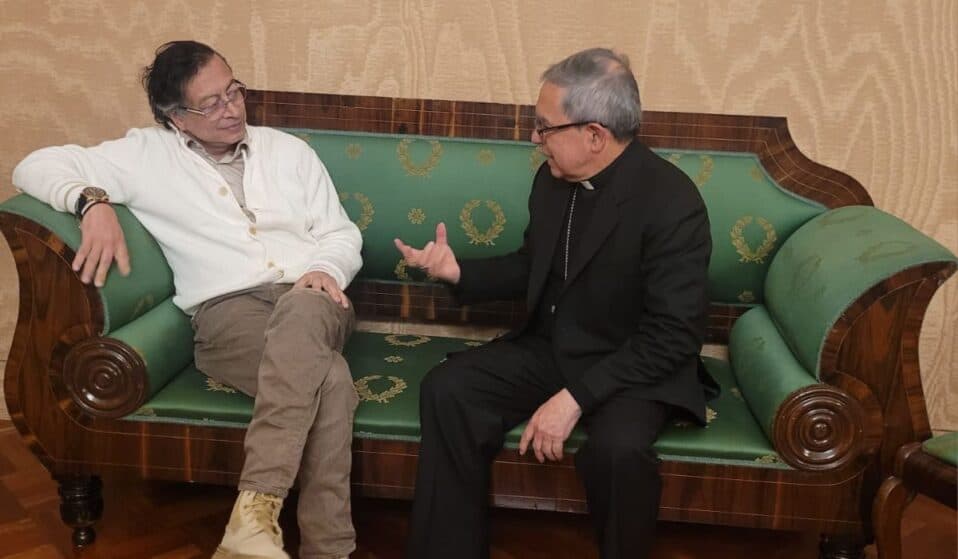SÃO PAULO, Brazil – Amid a growing wave of violence in Colombia, the Church decided to play an active role in promoting peace, calling President Gustavo Petro and other authorities to dialogue.
There is a tragic phenomenon taking place in the South American nation, and its impact encompassed not only a potential presidential candidate being shot during a rally, but also millions of citizens displaced by armed groups,
Cardinal Luis José Rueda, the Archbishop of Bogotá, took the initiative to launch a series of conversations with top State authorities in Colombia after a serious deterioration of public security in the country, something that has been occurring side by side with the intensification of a politically charged atmosphere.
On June 7, 39-year-old senator Miguel Uribe Turbay, a potential candidate in the 2026 presidential election, was shot three times as he spoke during an event in the Modelia district of Bogotá. One of the bullets hit his leg, while another one seriously harmed his head. He’s been undergoing treatment in critical condition since then.
Despite arresting the teenager who fired the gun and two suspects of involvement in the attack police have still not discovered the mastermind behind the crime – identified by one of the detainees as a criminal operating in Ecuador.
While Uribe fights for his life at the hospital, millions of Colombians face forced migration due to armed conflicts in regions like Chocó, Nariño, Cauca y Valle del Cauca. According to the Office of the United Nations High Commissioner for Refugees (UNHCR), seven million people had to leave their homes because of dissident guerrilla groups over the past years – 1.6 million of them since 2016, when a peace agreement was signed between the government and the Revolutionary Armed Forces of Colombia (FARC), one of the most important guerrilla organizations operating in the nation.
A number of squadrons didn’t agree to follow their commanders and put the guns down. Such dissident groups have been operating as independent units since then. Their clashes with the army or with enemy organizations have been affecting entire populations in those provinces, with uncountable deaths of civilians caught in the middle of shootings.
According to the UNHCR, at least 118,000 people have been imprisoned in their homes due to such groups, which control large areas of cocaine production.
On June 10, a series of attacks were launched by some of those guerrillas against targets in Cali, Colombia’s third largest city. Cars containing explosives and drones were used in the actions, whose goal was to damage police stations and government buildings. At least four people died, including two policemen.
Left-winger Petro has been under criticism due to the failure of his administration to improve public security, including the collapse of his peace plan with guerrillas. One of the most vocal critics of the president has been Uribe Turbay.
“The Church and the Episcopal Conference are profoundly concerned about the situation in our country. But we won’t stay quiet and we won’t lose our hope,” Cardinal Rueda told Crux, adding that the idea is to work as “promoters and sowers of hope.”
“In this painful moment after the attack suffered by senator Miguel Uribe Turbay and after several acts of violence that we see in our country, besides a polarized atmosphere, we suggested talking with each one of the heads of State,” he explained.
Rueda met with Petro on June 10. They talked about the need to promote an institutional encounter with the leaders of Congress and members of the highest courts.
“We need to reach all those men and women who are in charge of the State in order to issue a joint message to the country, saying that we repudiate all forms of violence, aggression and disrespect to life and that we are committed to work together to find a rational and ethical solution for the conflicts,” Rueda said.
He recalled that Pope Francis used to promote the so-called “culture of encounter,” something that Colombia has been missing, and added that Pope Leo XIV has expressed his desire that humanity finds paths for reconciliation and peace.
“The Church is called to build bridges. It’s a difficult art to dialogue and establish consensus. But we have to do it with Jesus Christ and the force of the Holy Spirit,” Rueda said.











